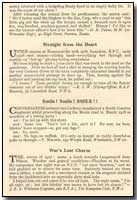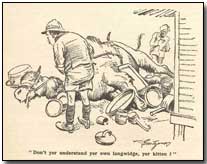Memoirs & Diaries - The Best 500 Cockney War Stories - Straight From the Heart and Other Stories
 Published in London
in 1921, The Best 500 Cockney War Stories
comprised, in the words of its newspaper publisher (The London Evening
News) "a remembering and retelling of those war days when laughter
sometimes saved men's reason".
Published in London
in 1921, The Best 500 Cockney War Stories
comprised, in the words of its newspaper publisher (The London Evening
News) "a remembering and retelling of those war days when laughter
sometimes saved men's reason".
The collection of short memoirs, some 500 in total, is divided into five categories - Action, Lull, Hospital, High Seas and Here and There. This page contains five stories from Lull, led by Straight From the Heart.
Other sections within the collection can be accessed using the sidebar to the right.
Straight From the Heart
Under canvas at Rousseauville with 27th Squadron, R.F.C., early 1918 - wet season - raining hard - everything wet through and muddy - a "fed-up" gloomy feeling everywhere.
We were trying to start a 3-ton lorry that was stuck in the mud on the aerodrome. After we had all had a shot at swinging the starting handle, the very Cockney driver of the lorry completely exhausted himself in yet another unsuccessful attempt to start up.
Then, leaning against the radiator and pushing his cap back, he puffed out:
"I dunno! These perishin' lorries are enough to take all the flamin' romance out of any blinkin' camp!"
R. S. W. (Flying-Officer, R.A.F. Reserve), 52 Cavendish Road, N.W.6
Smile! Smile! SMILE!!
Conversation between two Cockney members of a North Country regiment whilst proceeding along the Menin road in March 1918 as members of a wiring party:
1st: I'm fed up with this stunt.
2nd: Same 'ere. 'Tain't 'arf a life, ain't it? No rest, no beer, blinkin' leave stopped - er, got any fags?
1st: No, mate.
2nd: No fags, no nuffink. It's only us keepin' so ruddy cheerful as pulls us through.
V. Marston, 232 Worple Road, Wimbledon, S.W.20
War's Lost Charm
Time, winter of 1917: scene, a track towards Langemarck from Pilkem. Weather and general conditions - Flanders at its worst.
My companion that night was an N.C.O. "out since 'fourteen," and we had plodded on in silence for some time. Suddenly behind me there was a slither, a splash, and a smothered remark as the sergeant skidded from the duckboard into an especially dirty shell hole.
I helped him out and asked if he was all right. The reply came, "I'm all right, sir; but this blinkin' war seems to have lost its charm!"
J. E. A. Whitman (Captain, late R.F.A.), The Hampden Club, N.W.1
Taking It Lying Down
The 1st Battalion of the 25th Londons was preparing to march into Waziristan.
Old Bert, the cook, diligently loading up a kneeling camel with dixies, pots and pans, and general cooking utensils, paused for a bit, wiped the sweat from his brow, and stood back with arms akimbo gazing with satisfaction upon his work.
Then he went up to the camel, gave him a gentle prod, and grunted "Ooush, yer blighter, ooush" (i.e. rise).
The camel turned gently over on his back, unshipping the whole cargo that Bert had worked so hard upon, and kicked his legs in the air.
Poor old Bert looked at the wreckage and exclaimed, more in sorrow than in anger: "Blimey, don't yer understand yer own langwidge, yer kitten?"
T. F. Chanter, 16 Atalanta Street, Fulham
The First Twenty Years
It was round about Christmas 1917, and we were resting (?) at "Dirty Bucket Corner."
The Christmas present we all had in view was a return to the line in front of Ypres. On the day before we were due to return the Christmas post arrived, and after the excitement had abated the usual "blueness" settled in - the craving for home comforts and "Blighty."
My partners in the stretcher-bearing squad included a meek and mild man (I believe he was a schoolmaster before the war) and a Cockney from Seven Dials. We used to call him "Townie."
Although the ex-schoolmaster would have had cause in more normal times to rejoice - for the post contained a letter telling him that he had become the father of a bonny boy - the news made him morbid.
Of course, we all congratulated him. Meanwhile "Townie" was busy with a pencil and writing pad, and after a few minutes handed to the new parent a sheet of paper folded in half.
The recipient unfolded it and looked at it for several seconds before the rest of us became interested and looked over his shoulder.
The paper was covered with lines, circles, and writing that appeared to us like "double-Dutch."
"What's this?" the father asked.
"That's a map I drawed fer yer kid. It'll show him where the old pot and pan is when he's called up," and he concluded with this after-thought: "Tell 'im ter be careful of that ruddy shell-hole just acrost there. I've fallen in the perishin' thing twice this week."
" Medico." (58th (London) Division), Clapham Common, S.W.11
Next - Shell as a Hammer and four other stories
The German word "U-Boat" was derived from "Unterseeboot" (undersea boat).
- Did you know?

